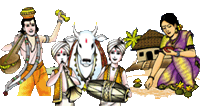| |
| |
| Sankranthi |
|
| |
 |
| |
| |
14 January is celebrated as SANKRANTHI or PONGAL.
Certain Hindu festivals are associated with the annual cycle of seasons. Pongal in the South is celebrated to mark the withdrawal of the southeast monsoons as well as the reaping of the harvest. It is the biggest harvest festival, spread over three days.
How People Celebrate Sankranthi
Pongal denotes a sweet preparation made from rice. Each of the three days are marked by different festivities. The first day, Bhogi Pongal, is a day for the family. Surya Pongal, the second day, is dedicated to the worship of Surya, the Sun God. Boiled milk and jaggery is offered to the Sun God, and friends greet each other asking, "Is it boiled?" The answer: "Yes, it is." The third day of Pongal, Mattu Pongal, is for worship of the cattle known as mattu). Cattle are bathed, their horns polished and painted in bright colours, and garlands of flowers placed around their necks. The pongal that has been offered to the Gods is then given to cattle and birds to eat.
The advent of Pongal is associated with spring-cleaning and burning of rubbish, symbolizing the destruction of evil. Decorative designs or rangolis are traced on floors and on the day of the Pongal, the newly harvested rice is cooked in homes to acclaim the bounty of the gods.
In Madras, a rath yatra procession is taken out from the Kandaswamy Temple. In Madurai, Tanjore and Tiruchirrapalli, where Pongal is known as Jellikattu, bundles of money are tied to the horns of bulls, and villagers try and wrest the bundles from them. Community meals are made from the freshly gathered harvest and enjoyed by the entire village.
To Hindus, the Sun stands for knowledge, spiritual light and wisdom. Makar Sankranti signifies that we should turn away from the darkness of delusion in which we live, and begin to enjoy a new life with bright light within us to shine brighter and brighter. We should gradually begin to grow in purity, wisdom, and knowledge, even as the Sun does from the Day of Makar Sankranti.
The festival of Makar Sankranti is highly regarded by the Hindus from North to down South. The day is known by various names and a variety of traditions are witnessed as one explores the festival in different states.
There is also a symbolic meaning to Makara Sankranti. ‘Makar’ means crocodile. Sankranti means ‘to cross into or change.’ The ‘Makara’ or crocodile represents the materialistic world and ‘Sankranti’ gives an opportunity to get away from the clutches of the crocodile or the materialistic world |
| |
|